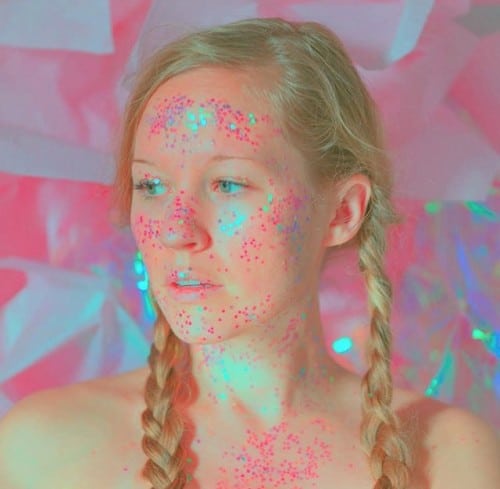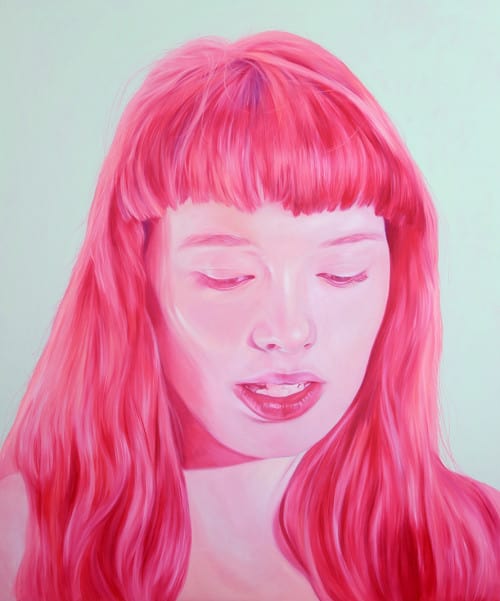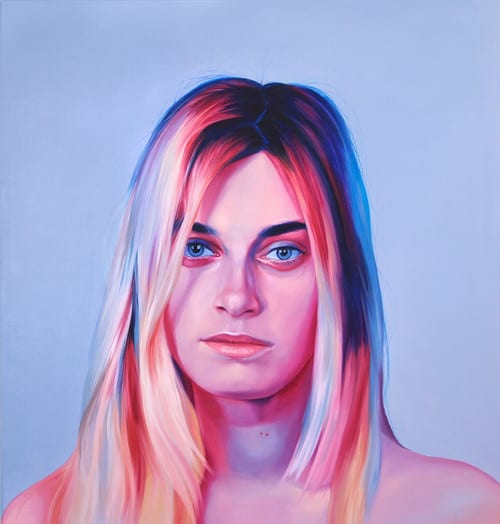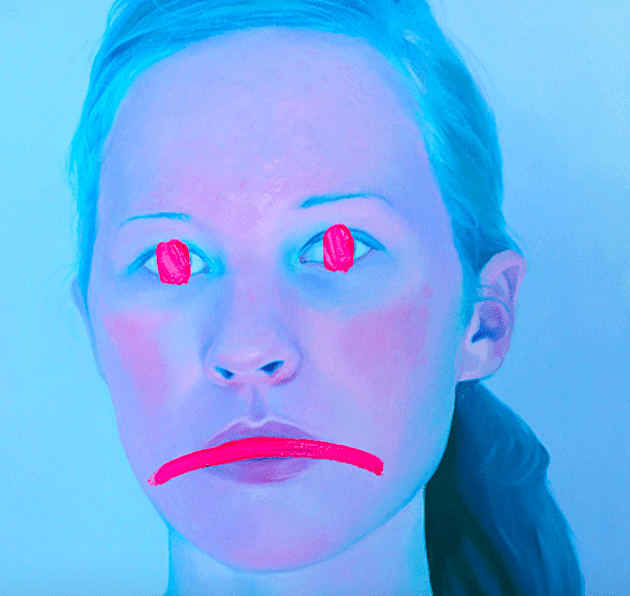In a lofty studio beside The Hoxton, there’s a portrait hanging on a wall of a woman in slimy glitter. Her eyes dart away from the camera and her reflection bounces off mirrors like she’s swimming in a pool of glass. Her pigtails are tied with ribbon, adding a weight of innocence to a grown woman in her late twenties. What looks pretty on first impression is now uncanny. Figurative painter Jen Mann does this on purpose; the woman in her new series is her.

“It’s called Cult of Femininity,” Mann says. It’s one of several photographs that Mann will paint onto canvas and paint with oil. Preparing for her next series, Mann is an artist who understands what it means to be a woman in the Internet age: Painfully self-aware, naïve and demoralized. She tells this story in her new large-scale portraiture series; a collection of subtitled movie scenes, moody self-portraits and reverberating light projections. She’s the lead character in a foreign movie about her life, documenting herself through degrees of separation from a person, photograph to painting.
“We narrate our lives through the Internet. Self-Absolved is about how we understand identity through that portrayal of ourselves.”
It’s not a new revelation, but it’s a relevant one that most women obsess over. Scroll through Instagram and you’ll find a stream of feminist quotes, movie stills, outfits and selfies. We find pleasure in seeing things that have patterns in online avatars (e.g., fonts, white borders, copy and content pillars). Mann plays with representation; how we define ourselves in the Internet age and what genuinely holds meaning.
In a portrait cloaked in cobalt blue, Mann captures the stark, moody moments of being a woman. One can’t help but make a reference to The Virgin Suicides; the dream-like montages that made audiences fall in love with the tormented Lisbon sisters. Mann’s repeated use of blue sticks out in all of her paintings; a colour many women can associate with Maggie Nelson’s Bluets – exploring the restraints of love and suffering in the colour blue. Juxtaposing beauty with ugly in each piece, Mann repeatedly forces audiences to wonder, Is she liberated by the representation of femininity or disgusted by it?
In another photograph, Mann floats with her head above water in a bathtub filled with rose petals. French subtitles translate to: I wonder if life is as romantic as what I dreamed. “We like to imagine ourselves as the main character in a foreign film,” Mann tells me. “I’m dealing with human issues, and painting very literal things or puns to make my paintings relatable to people. Audiences see meaning more clearly with things that are representational.”

Mann describes how femininity projects onto women. I want to know why she purposely makes audiences feel so uncomfortable with femininity. “Anything that’s ugly in today’s society is alluring. We grew up with bombarded by advertising with slick commercial ideals of beauty, and we’re attracted to it because we’re accustomed to it. But we’re also repulsed by it and want something that’s a little off.” Self-Absolved shines a light on that; the meticulous growing pain of achieving some idea of “uniqueness” in a society where nobody wants to be the same.
Being a kill-joy, I can’t help but preoccupy my thoughts with the dark side of Mann’s work. Continuing her theme of existentialism from her previous series, Self-Absolved caters to the optimist and pessimist in all of us. Aware of this, Mann isn’t pretentious or high-brow about her work; quite contrary. She’s laughing. “I want people to get it. I want people to be engaged with my work, instead of having pretentious work that nobody gets. I want them to enjoy it for whatever they enjoy it for, and if they appreciate it purely on an aesthetic level, that’s fine. If they enjoy it because they relate to it, even better.” Mann says.
Like a word repeated too many times, Mann forces us to consider the meaning of the word femininity over and over again. Capturing the attention of her audiences with large-scale portraiture, romantic hues of pinks and blues and shifty eyes, the work itself holds a stark realism that’s beautiful and disgusting. The only thing left to do is to laugh at ourselves.
Learn more about Jen Mann on her website or Instagram.




 Follow Us On Instagram
Follow Us On Instagram
